Report on UK Law: Classifications, Sources, and Law-Making Processes
VerifiedAdded on 2023/06/10
|8
|3071
|173
Report
AI Summary
This report provides a comprehensive overview of the UK legal system. It begins by classifying laws into common and statutory law, civil and criminal law, and discusses the roles of different courts including the High Court and Supreme Court. The report then examines the sources of law, with a focus on case law (precedents) and the process of making legislations, including the roles of the House of Lords and House of People. It also explains the concept of delegated legislation. The main body then delves into specific areas of law, including contract law (offer vs. invitation to treat, consideration, postal rule), employment law (statutory duties of employers, wrongful and unfair dismissal), and the law of torts (duty of care in negligence). The report concludes by summarizing the key aspects of UK law and the importance of each element discussed.

Assessment
Paraphrase This Document
Need a fresh take? Get an instant paraphrase of this document with our AI Paraphraser
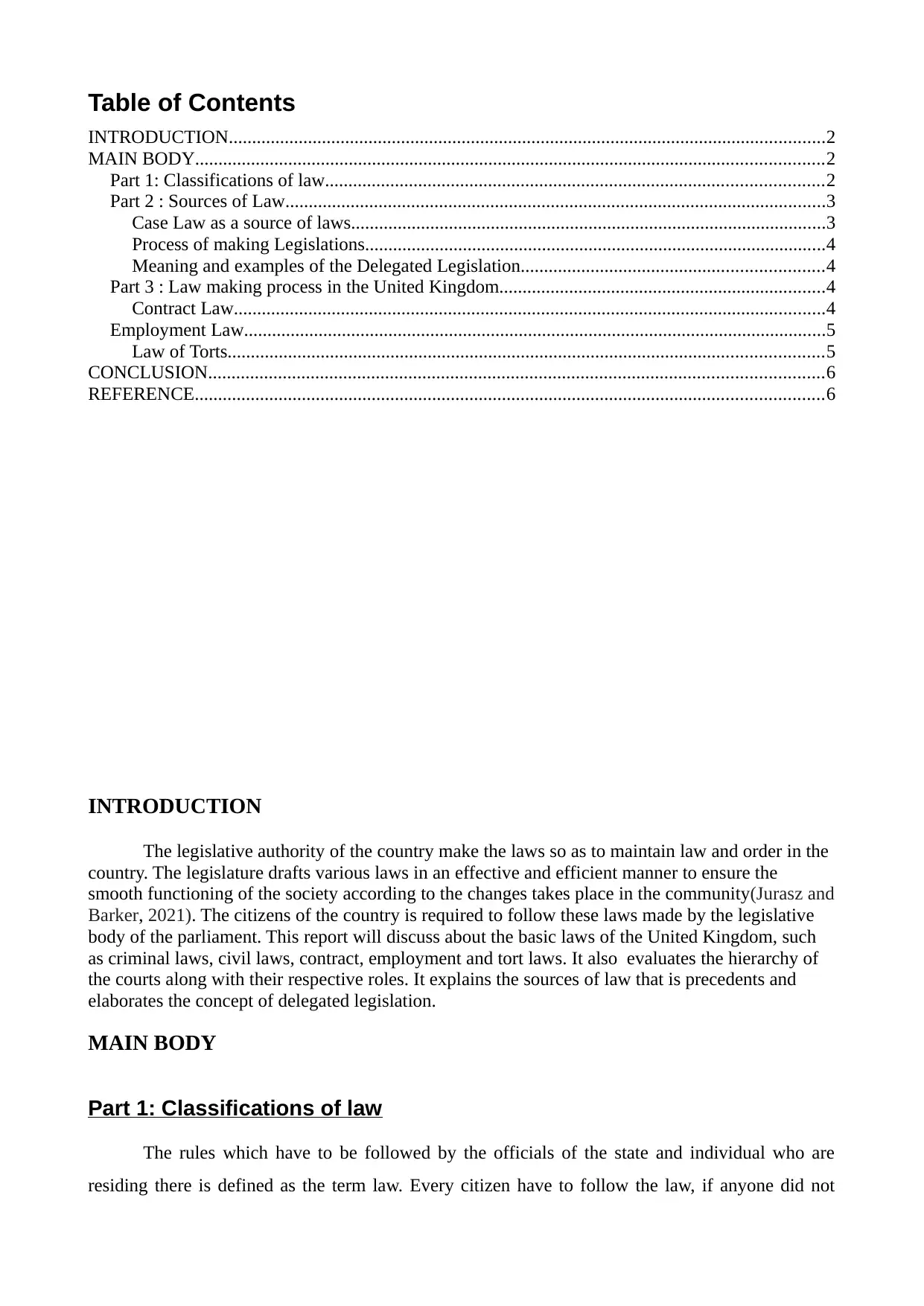
Table of Contents
INTRODUCTION................................................................................................................................2
MAIN BODY.......................................................................................................................................2
Part 1: Classifications of law...........................................................................................................2
Part 2 : Sources of Law....................................................................................................................3
Case Law as a source of laws......................................................................................................3
Process of making Legislations...................................................................................................4
Meaning and examples of the Delegated Legislation.................................................................4
Part 3 : Law making process in the United Kingdom......................................................................4
Contract Law...............................................................................................................................4
Employment Law.............................................................................................................................5
Law of Torts................................................................................................................................5
CONCLUSION....................................................................................................................................6
REFERENCE.......................................................................................................................................6
INTRODUCTION
The legislative authority of the country make the laws so as to maintain law and order in the
country. The legislature drafts various laws in an effective and efficient manner to ensure the
smooth functioning of the society according to the changes takes place in the community(Jurasz and
Barker, 2021). The citizens of the country is required to follow these laws made by the legislative
body of the parliament. This report will discuss about the basic laws of the United Kingdom, such
as criminal laws, civil laws, contract, employment and tort laws. It also evaluates the hierarchy of
the courts along with their respective roles. It explains the sources of law that is precedents and
elaborates the concept of delegated legislation.
MAIN BODY
Part 1: Classifications of law
The rules which have to be followed by the officials of the state and individual who are
residing there is defined as the term law. Every citizen have to follow the law, if anyone did not
INTRODUCTION................................................................................................................................2
MAIN BODY.......................................................................................................................................2
Part 1: Classifications of law...........................................................................................................2
Part 2 : Sources of Law....................................................................................................................3
Case Law as a source of laws......................................................................................................3
Process of making Legislations...................................................................................................4
Meaning and examples of the Delegated Legislation.................................................................4
Part 3 : Law making process in the United Kingdom......................................................................4
Contract Law...............................................................................................................................4
Employment Law.............................................................................................................................5
Law of Torts................................................................................................................................5
CONCLUSION....................................................................................................................................6
REFERENCE.......................................................................................................................................6
INTRODUCTION
The legislative authority of the country make the laws so as to maintain law and order in the
country. The legislature drafts various laws in an effective and efficient manner to ensure the
smooth functioning of the society according to the changes takes place in the community(Jurasz and
Barker, 2021). The citizens of the country is required to follow these laws made by the legislative
body of the parliament. This report will discuss about the basic laws of the United Kingdom, such
as criminal laws, civil laws, contract, employment and tort laws. It also evaluates the hierarchy of
the courts along with their respective roles. It explains the sources of law that is precedents and
elaborates the concept of delegated legislation.
MAIN BODY
Part 1: Classifications of law
The rules which have to be followed by the officials of the state and individual who are
residing there is defined as the term law. Every citizen have to follow the law, if anyone did not
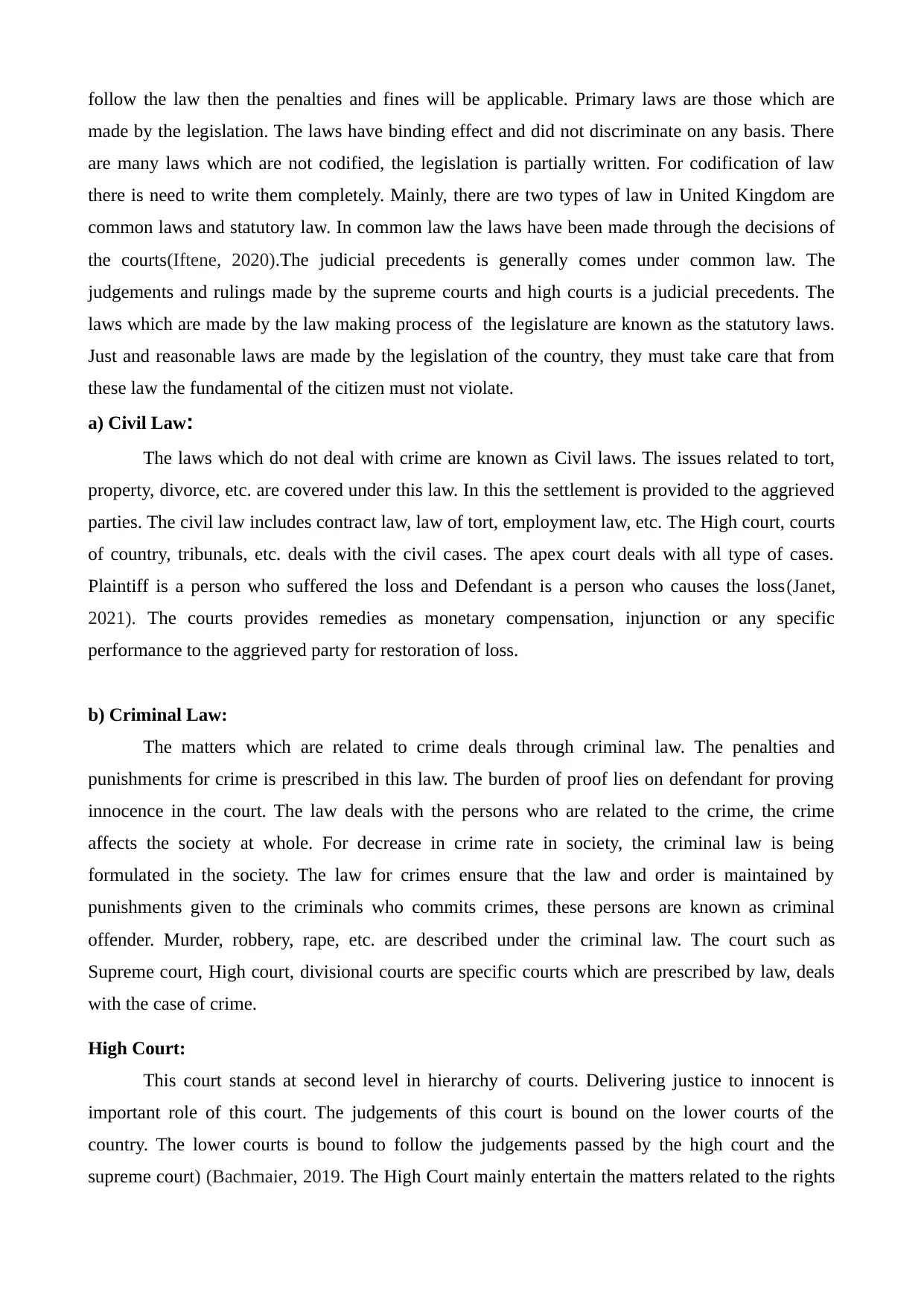
follow the law then the penalties and fines will be applicable. Primary laws are those which are
made by the legislation. The laws have binding effect and did not discriminate on any basis. There
are many laws which are not codified, the legislation is partially written. For codification of law
there is need to write them completely. Mainly, there are two types of law in United Kingdom are
common laws and statutory law. In common law the laws have been made through the decisions of
the courts(Iftene, 2020).The judicial precedents is generally comes under common law. The
judgements and rulings made by the supreme courts and high courts is a judicial precedents. The
laws which are made by the law making process of the legislature are known as the statutory laws.
Just and reasonable laws are made by the legislation of the country, they must take care that from
these law the fundamental of the citizen must not violate.
a) Civil Law:
The laws which do not deal with crime are known as Civil laws. The issues related to tort,
property, divorce, etc. are covered under this law. In this the settlement is provided to the aggrieved
parties. The civil law includes contract law, law of tort, employment law, etc. The High court, courts
of country, tribunals, etc. deals with the civil cases. The apex court deals with all type of cases.
Plaintiff is a person who suffered the loss and Defendant is a person who causes the loss(Janet,
2021). The courts provides remedies as monetary compensation, injunction or any specific
performance to the aggrieved party for restoration of loss.
b) Criminal Law:
The matters which are related to crime deals through criminal law. The penalties and
punishments for crime is prescribed in this law. The burden of proof lies on defendant for proving
innocence in the court. The law deals with the persons who are related to the crime, the crime
affects the society at whole. For decrease in crime rate in society, the criminal law is being
formulated in the society. The law for crimes ensure that the law and order is maintained by
punishments given to the criminals who commits crimes, these persons are known as criminal
offender. Murder, robbery, rape, etc. are described under the criminal law. The court such as
Supreme court, High court, divisional courts are specific courts which are prescribed by law, deals
with the case of crime.
High Court:
This court stands at second level in hierarchy of courts. Delivering justice to innocent is
important role of this court. The judgements of this court is bound on the lower courts of the
country. The lower courts is bound to follow the judgements passed by the high court and the
supreme court) (Bachmaier, 2019. The High Court mainly entertain the matters related to the rights
made by the legislation. The laws have binding effect and did not discriminate on any basis. There
are many laws which are not codified, the legislation is partially written. For codification of law
there is need to write them completely. Mainly, there are two types of law in United Kingdom are
common laws and statutory law. In common law the laws have been made through the decisions of
the courts(Iftene, 2020).The judicial precedents is generally comes under common law. The
judgements and rulings made by the supreme courts and high courts is a judicial precedents. The
laws which are made by the law making process of the legislature are known as the statutory laws.
Just and reasonable laws are made by the legislation of the country, they must take care that from
these law the fundamental of the citizen must not violate.
a) Civil Law:
The laws which do not deal with crime are known as Civil laws. The issues related to tort,
property, divorce, etc. are covered under this law. In this the settlement is provided to the aggrieved
parties. The civil law includes contract law, law of tort, employment law, etc. The High court, courts
of country, tribunals, etc. deals with the civil cases. The apex court deals with all type of cases.
Plaintiff is a person who suffered the loss and Defendant is a person who causes the loss(Janet,
2021). The courts provides remedies as monetary compensation, injunction or any specific
performance to the aggrieved party for restoration of loss.
b) Criminal Law:
The matters which are related to crime deals through criminal law. The penalties and
punishments for crime is prescribed in this law. The burden of proof lies on defendant for proving
innocence in the court. The law deals with the persons who are related to the crime, the crime
affects the society at whole. For decrease in crime rate in society, the criminal law is being
formulated in the society. The law for crimes ensure that the law and order is maintained by
punishments given to the criminals who commits crimes, these persons are known as criminal
offender. Murder, robbery, rape, etc. are described under the criminal law. The court such as
Supreme court, High court, divisional courts are specific courts which are prescribed by law, deals
with the case of crime.
High Court:
This court stands at second level in hierarchy of courts. Delivering justice to innocent is
important role of this court. The judgements of this court is bound on the lower courts of the
country. The lower courts is bound to follow the judgements passed by the high court and the
supreme court) (Bachmaier, 2019. The High Court mainly entertain the matters related to the rights
⊘ This is a preview!⊘
Do you want full access?
Subscribe today to unlock all pages.

Trusted by 1+ million students worldwide
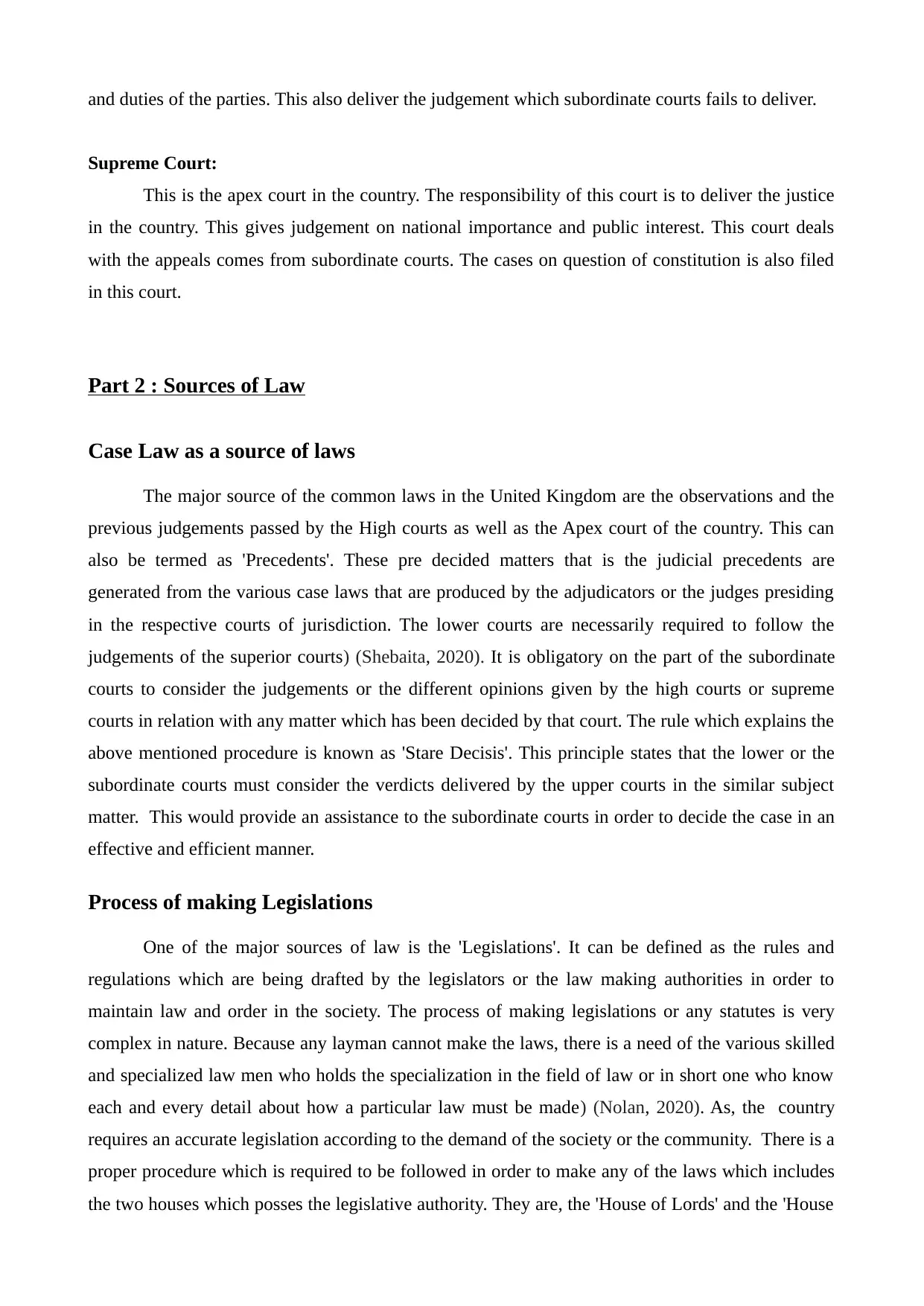
and duties of the parties. This also deliver the judgement which subordinate courts fails to deliver.
Supreme Court:
This is the apex court in the country. The responsibility of this court is to deliver the justice
in the country. This gives judgement on national importance and public interest. This court deals
with the appeals comes from subordinate courts. The cases on question of constitution is also filed
in this court.
Part 2 : Sources of Law
Case Law as a source of laws
The major source of the common laws in the United Kingdom are the observations and the
previous judgements passed by the High courts as well as the Apex court of the country. This can
also be termed as 'Precedents'. These pre decided matters that is the judicial precedents are
generated from the various case laws that are produced by the adjudicators or the judges presiding
in the respective courts of jurisdiction. The lower courts are necessarily required to follow the
judgements of the superior courts) (Shebaita, 2020). It is obligatory on the part of the subordinate
courts to consider the judgements or the different opinions given by the high courts or supreme
courts in relation with any matter which has been decided by that court. The rule which explains the
above mentioned procedure is known as 'Stare Decisis'. This principle states that the lower or the
subordinate courts must consider the verdicts delivered by the upper courts in the similar subject
matter. This would provide an assistance to the subordinate courts in order to decide the case in an
effective and efficient manner.
Process of making Legislations
One of the major sources of law is the 'Legislations'. It can be defined as the rules and
regulations which are being drafted by the legislators or the law making authorities in order to
maintain law and order in the society. The process of making legislations or any statutes is very
complex in nature. Because any layman cannot make the laws, there is a need of the various skilled
and specialized law men who holds the specialization in the field of law or in short one who know
each and every detail about how a particular law must be made) (Nolan, 2020). As, the country
requires an accurate legislation according to the demand of the society or the community. There is a
proper procedure which is required to be followed in order to make any of the laws which includes
the two houses which posses the legislative authority. They are, the 'House of Lords' and the 'House
Supreme Court:
This is the apex court in the country. The responsibility of this court is to deliver the justice
in the country. This gives judgement on national importance and public interest. This court deals
with the appeals comes from subordinate courts. The cases on question of constitution is also filed
in this court.
Part 2 : Sources of Law
Case Law as a source of laws
The major source of the common laws in the United Kingdom are the observations and the
previous judgements passed by the High courts as well as the Apex court of the country. This can
also be termed as 'Precedents'. These pre decided matters that is the judicial precedents are
generated from the various case laws that are produced by the adjudicators or the judges presiding
in the respective courts of jurisdiction. The lower courts are necessarily required to follow the
judgements of the superior courts) (Shebaita, 2020). It is obligatory on the part of the subordinate
courts to consider the judgements or the different opinions given by the high courts or supreme
courts in relation with any matter which has been decided by that court. The rule which explains the
above mentioned procedure is known as 'Stare Decisis'. This principle states that the lower or the
subordinate courts must consider the verdicts delivered by the upper courts in the similar subject
matter. This would provide an assistance to the subordinate courts in order to decide the case in an
effective and efficient manner.
Process of making Legislations
One of the major sources of law is the 'Legislations'. It can be defined as the rules and
regulations which are being drafted by the legislators or the law making authorities in order to
maintain law and order in the society. The process of making legislations or any statutes is very
complex in nature. Because any layman cannot make the laws, there is a need of the various skilled
and specialized law men who holds the specialization in the field of law or in short one who know
each and every detail about how a particular law must be made) (Nolan, 2020). As, the country
requires an accurate legislation according to the demand of the society or the community. There is a
proper procedure which is required to be followed in order to make any of the laws which includes
the two houses which posses the legislative authority. They are, the 'House of Lords' and the 'House
Paraphrase This Document
Need a fresh take? Get an instant paraphrase of this document with our AI Paraphraser
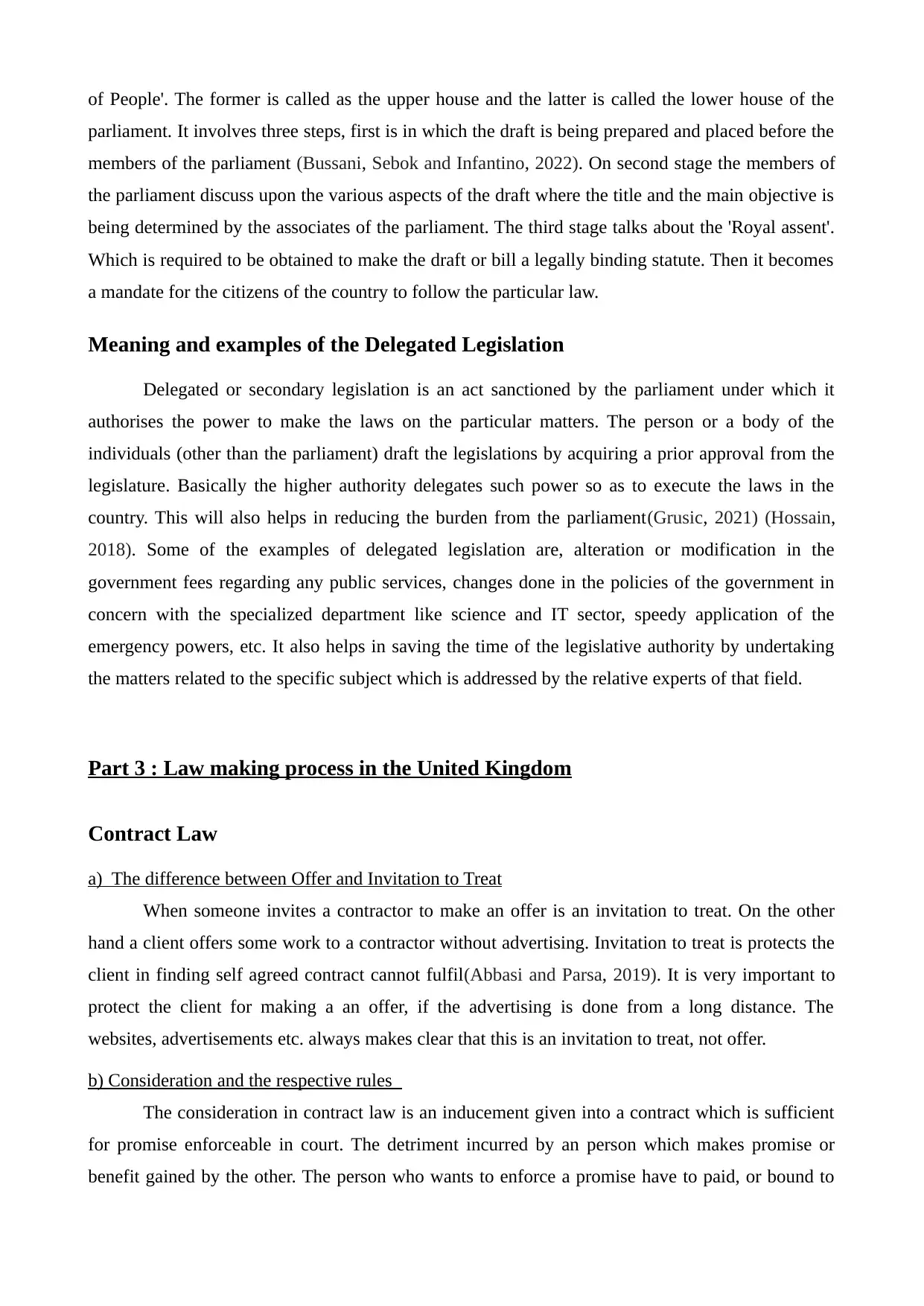
of People'. The former is called as the upper house and the latter is called the lower house of the
parliament. It involves three steps, first is in which the draft is being prepared and placed before the
members of the parliament (Bussani, Sebok and Infantino, 2022). On second stage the members of
the parliament discuss upon the various aspects of the draft where the title and the main objective is
being determined by the associates of the parliament. The third stage talks about the 'Royal assent'.
Which is required to be obtained to make the draft or bill a legally binding statute. Then it becomes
a mandate for the citizens of the country to follow the particular law.
Meaning and examples of the Delegated Legislation
Delegated or secondary legislation is an act sanctioned by the parliament under which it
authorises the power to make the laws on the particular matters. The person or a body of the
individuals (other than the parliament) draft the legislations by acquiring a prior approval from the
legislature. Basically the higher authority delegates such power so as to execute the laws in the
country. This will also helps in reducing the burden from the parliament(Grusic, 2021) (Hossain,
2018). Some of the examples of delegated legislation are, alteration or modification in the
government fees regarding any public services, changes done in the policies of the government in
concern with the specialized department like science and IT sector, speedy application of the
emergency powers, etc. It also helps in saving the time of the legislative authority by undertaking
the matters related to the specific subject which is addressed by the relative experts of that field.
Part 3 : Law making process in the United Kingdom
Contract Law
a) The difference between Offer and Invitation to Treat
When someone invites a contractor to make an offer is an invitation to treat. On the other
hand a client offers some work to a contractor without advertising. Invitation to treat is protects the
client in finding self agreed contract cannot fulfil(Abbasi and Parsa, 2019). It is very important to
protect the client for making a an offer, if the advertising is done from a long distance. The
websites, advertisements etc. always makes clear that this is an invitation to treat, not offer.
b) Consideration and the respective rules
The consideration in contract law is an inducement given into a contract which is sufficient
for promise enforceable in court. The detriment incurred by an person which makes promise or
benefit gained by the other. The person who wants to enforce a promise have to paid, or bound to
parliament. It involves three steps, first is in which the draft is being prepared and placed before the
members of the parliament (Bussani, Sebok and Infantino, 2022). On second stage the members of
the parliament discuss upon the various aspects of the draft where the title and the main objective is
being determined by the associates of the parliament. The third stage talks about the 'Royal assent'.
Which is required to be obtained to make the draft or bill a legally binding statute. Then it becomes
a mandate for the citizens of the country to follow the particular law.
Meaning and examples of the Delegated Legislation
Delegated or secondary legislation is an act sanctioned by the parliament under which it
authorises the power to make the laws on the particular matters. The person or a body of the
individuals (other than the parliament) draft the legislations by acquiring a prior approval from the
legislature. Basically the higher authority delegates such power so as to execute the laws in the
country. This will also helps in reducing the burden from the parliament(Grusic, 2021) (Hossain,
2018). Some of the examples of delegated legislation are, alteration or modification in the
government fees regarding any public services, changes done in the policies of the government in
concern with the specialized department like science and IT sector, speedy application of the
emergency powers, etc. It also helps in saving the time of the legislative authority by undertaking
the matters related to the specific subject which is addressed by the relative experts of that field.
Part 3 : Law making process in the United Kingdom
Contract Law
a) The difference between Offer and Invitation to Treat
When someone invites a contractor to make an offer is an invitation to treat. On the other
hand a client offers some work to a contractor without advertising. Invitation to treat is protects the
client in finding self agreed contract cannot fulfil(Abbasi and Parsa, 2019). It is very important to
protect the client for making a an offer, if the advertising is done from a long distance. The
websites, advertisements etc. always makes clear that this is an invitation to treat, not offer.
b) Consideration and the respective rules
The consideration in contract law is an inducement given into a contract which is sufficient
for promise enforceable in court. The detriment incurred by an person which makes promise or
benefit gained by the other. The person who wants to enforce a promise have to paid, or bound to
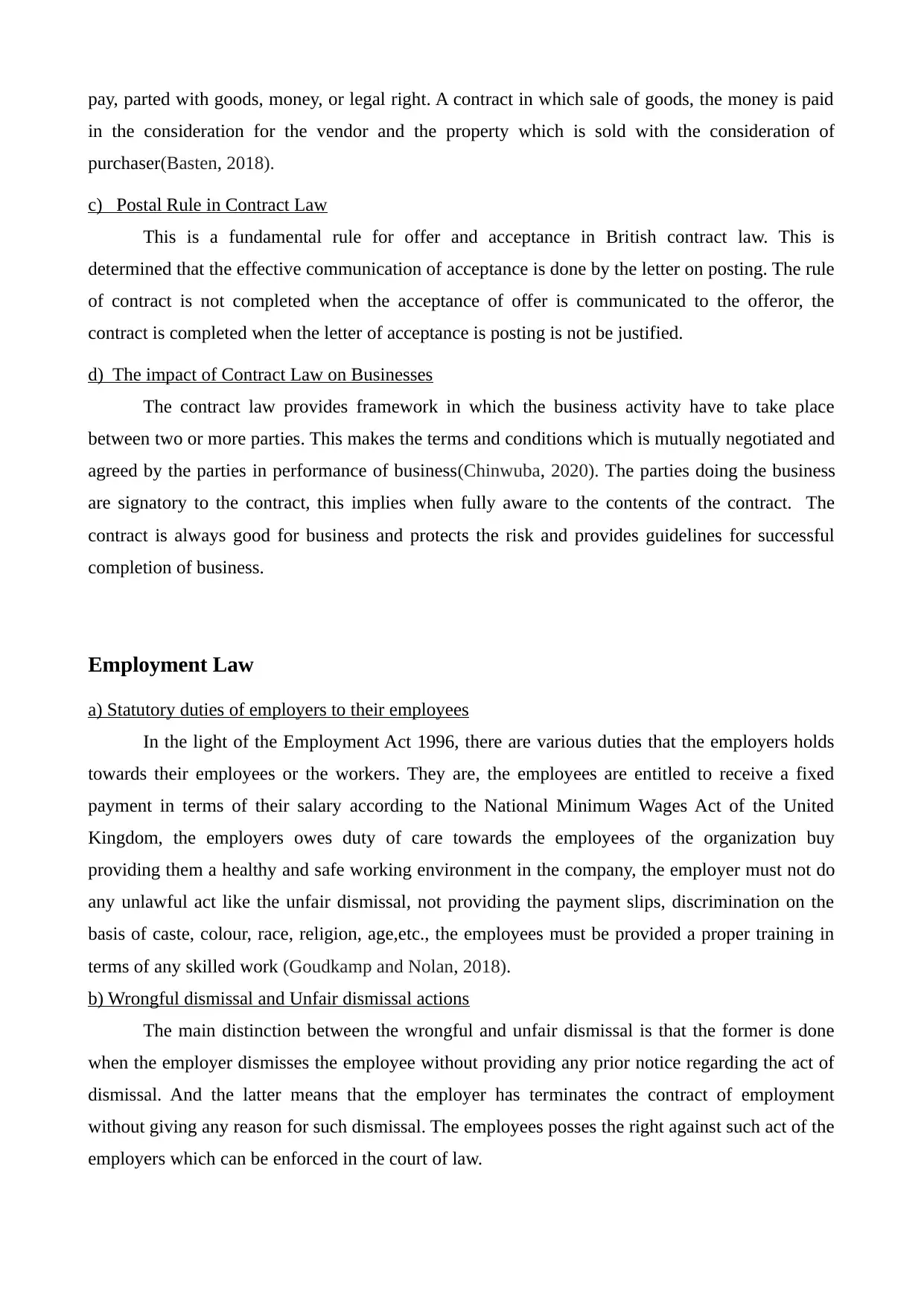
pay, parted with goods, money, or legal right. A contract in which sale of goods, the money is paid
in the consideration for the vendor and the property which is sold with the consideration of
purchaser(Basten, 2018).
c) Postal Rule in Contract Law
This is a fundamental rule for offer and acceptance in British contract law. This is
determined that the effective communication of acceptance is done by the letter on posting. The rule
of contract is not completed when the acceptance of offer is communicated to the offeror, the
contract is completed when the letter of acceptance is posting is not be justified.
d) The impact of Contract Law on Businesses
The contract law provides framework in which the business activity have to take place
between two or more parties. This makes the terms and conditions which is mutually negotiated and
agreed by the parties in performance of business(Chinwuba, 2020). The parties doing the business
are signatory to the contract, this implies when fully aware to the contents of the contract. The
contract is always good for business and protects the risk and provides guidelines for successful
completion of business.
Employment Law
a) Statutory duties of employers to their employees
In the light of the Employment Act 1996, there are various duties that the employers holds
towards their employees or the workers. They are, the employees are entitled to receive a fixed
payment in terms of their salary according to the National Minimum Wages Act of the United
Kingdom, the employers owes duty of care towards the employees of the organization buy
providing them a healthy and safe working environment in the company, the employer must not do
any unlawful act like the unfair dismissal, not providing the payment slips, discrimination on the
basis of caste, colour, race, religion, age,etc., the employees must be provided a proper training in
terms of any skilled work (Goudkamp and Nolan, 2018).
b) Wrongful dismissal and Unfair dismissal actions
The main distinction between the wrongful and unfair dismissal is that the former is done
when the employer dismisses the employee without providing any prior notice regarding the act of
dismissal. And the latter means that the employer has terminates the contract of employment
without giving any reason for such dismissal. The employees posses the right against such act of the
employers which can be enforced in the court of law.
in the consideration for the vendor and the property which is sold with the consideration of
purchaser(Basten, 2018).
c) Postal Rule in Contract Law
This is a fundamental rule for offer and acceptance in British contract law. This is
determined that the effective communication of acceptance is done by the letter on posting. The rule
of contract is not completed when the acceptance of offer is communicated to the offeror, the
contract is completed when the letter of acceptance is posting is not be justified.
d) The impact of Contract Law on Businesses
The contract law provides framework in which the business activity have to take place
between two or more parties. This makes the terms and conditions which is mutually negotiated and
agreed by the parties in performance of business(Chinwuba, 2020). The parties doing the business
are signatory to the contract, this implies when fully aware to the contents of the contract. The
contract is always good for business and protects the risk and provides guidelines for successful
completion of business.
Employment Law
a) Statutory duties of employers to their employees
In the light of the Employment Act 1996, there are various duties that the employers holds
towards their employees or the workers. They are, the employees are entitled to receive a fixed
payment in terms of their salary according to the National Minimum Wages Act of the United
Kingdom, the employers owes duty of care towards the employees of the organization buy
providing them a healthy and safe working environment in the company, the employer must not do
any unlawful act like the unfair dismissal, not providing the payment slips, discrimination on the
basis of caste, colour, race, religion, age,etc., the employees must be provided a proper training in
terms of any skilled work (Goudkamp and Nolan, 2018).
b) Wrongful dismissal and Unfair dismissal actions
The main distinction between the wrongful and unfair dismissal is that the former is done
when the employer dismisses the employee without providing any prior notice regarding the act of
dismissal. And the latter means that the employer has terminates the contract of employment
without giving any reason for such dismissal. The employees posses the right against such act of the
employers which can be enforced in the court of law.
⊘ This is a preview!⊘
Do you want full access?
Subscribe today to unlock all pages.

Trusted by 1+ million students worldwide
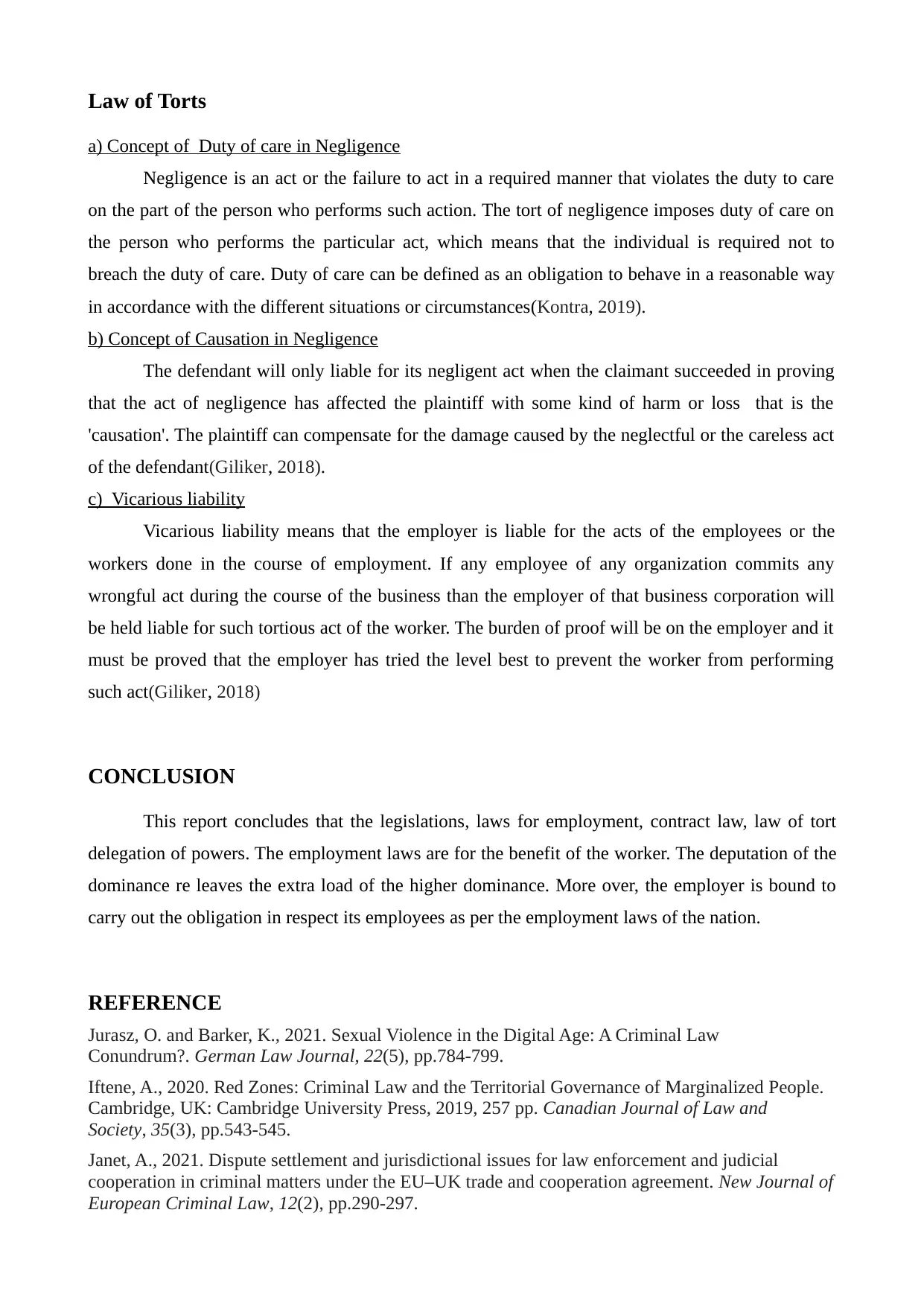
Law of Torts
a) Concept of Duty of care in Negligence
Negligence is an act or the failure to act in a required manner that violates the duty to care
on the part of the person who performs such action. The tort of negligence imposes duty of care on
the person who performs the particular act, which means that the individual is required not to
breach the duty of care. Duty of care can be defined as an obligation to behave in a reasonable way
in accordance with the different situations or circumstances(Kontra, 2019).
b) Concept of Causation in Negligence
The defendant will only liable for its negligent act when the claimant succeeded in proving
that the act of negligence has affected the plaintiff with some kind of harm or loss that is the
'causation'. The plaintiff can compensate for the damage caused by the neglectful or the careless act
of the defendant(Giliker, 2018).
c) Vicarious liability
Vicarious liability means that the employer is liable for the acts of the employees or the
workers done in the course of employment. If any employee of any organization commits any
wrongful act during the course of the business than the employer of that business corporation will
be held liable for such tortious act of the worker. The burden of proof will be on the employer and it
must be proved that the employer has tried the level best to prevent the worker from performing
such act(Giliker, 2018)
CONCLUSION
This report concludes that the legislations, laws for employment, contract law, law of tort
delegation of powers. The employment laws are for the benefit of the worker. The deputation of the
dominance re leaves the extra load of the higher dominance. More over, the employer is bound to
carry out the obligation in respect its employees as per the employment laws of the nation.
REFERENCE
Jurasz, O. and Barker, K., 2021. Sexual Violence in the Digital Age: A Criminal Law
Conundrum?. German Law Journal, 22(5), pp.784-799.
Iftene, A., 2020. Red Zones: Criminal Law and the Territorial Governance of Marginalized People.
Cambridge, UK: Cambridge University Press, 2019, 257 pp. Canadian Journal of Law and
Society, 35(3), pp.543-545.
Janet, A., 2021. Dispute settlement and jurisdictional issues for law enforcement and judicial
cooperation in criminal matters under the EU–UK trade and cooperation agreement. New Journal of
European Criminal Law, 12(2), pp.290-297.
a) Concept of Duty of care in Negligence
Negligence is an act or the failure to act in a required manner that violates the duty to care
on the part of the person who performs such action. The tort of negligence imposes duty of care on
the person who performs the particular act, which means that the individual is required not to
breach the duty of care. Duty of care can be defined as an obligation to behave in a reasonable way
in accordance with the different situations or circumstances(Kontra, 2019).
b) Concept of Causation in Negligence
The defendant will only liable for its negligent act when the claimant succeeded in proving
that the act of negligence has affected the plaintiff with some kind of harm or loss that is the
'causation'. The plaintiff can compensate for the damage caused by the neglectful or the careless act
of the defendant(Giliker, 2018).
c) Vicarious liability
Vicarious liability means that the employer is liable for the acts of the employees or the
workers done in the course of employment. If any employee of any organization commits any
wrongful act during the course of the business than the employer of that business corporation will
be held liable for such tortious act of the worker. The burden of proof will be on the employer and it
must be proved that the employer has tried the level best to prevent the worker from performing
such act(Giliker, 2018)
CONCLUSION
This report concludes that the legislations, laws for employment, contract law, law of tort
delegation of powers. The employment laws are for the benefit of the worker. The deputation of the
dominance re leaves the extra load of the higher dominance. More over, the employer is bound to
carry out the obligation in respect its employees as per the employment laws of the nation.
REFERENCE
Jurasz, O. and Barker, K., 2021. Sexual Violence in the Digital Age: A Criminal Law
Conundrum?. German Law Journal, 22(5), pp.784-799.
Iftene, A., 2020. Red Zones: Criminal Law and the Territorial Governance of Marginalized People.
Cambridge, UK: Cambridge University Press, 2019, 257 pp. Canadian Journal of Law and
Society, 35(3), pp.543-545.
Janet, A., 2021. Dispute settlement and jurisdictional issues for law enforcement and judicial
cooperation in criminal matters under the EU–UK trade and cooperation agreement. New Journal of
European Criminal Law, 12(2), pp.290-297.
Paraphrase This Document
Need a fresh take? Get an instant paraphrase of this document with our AI Paraphraser
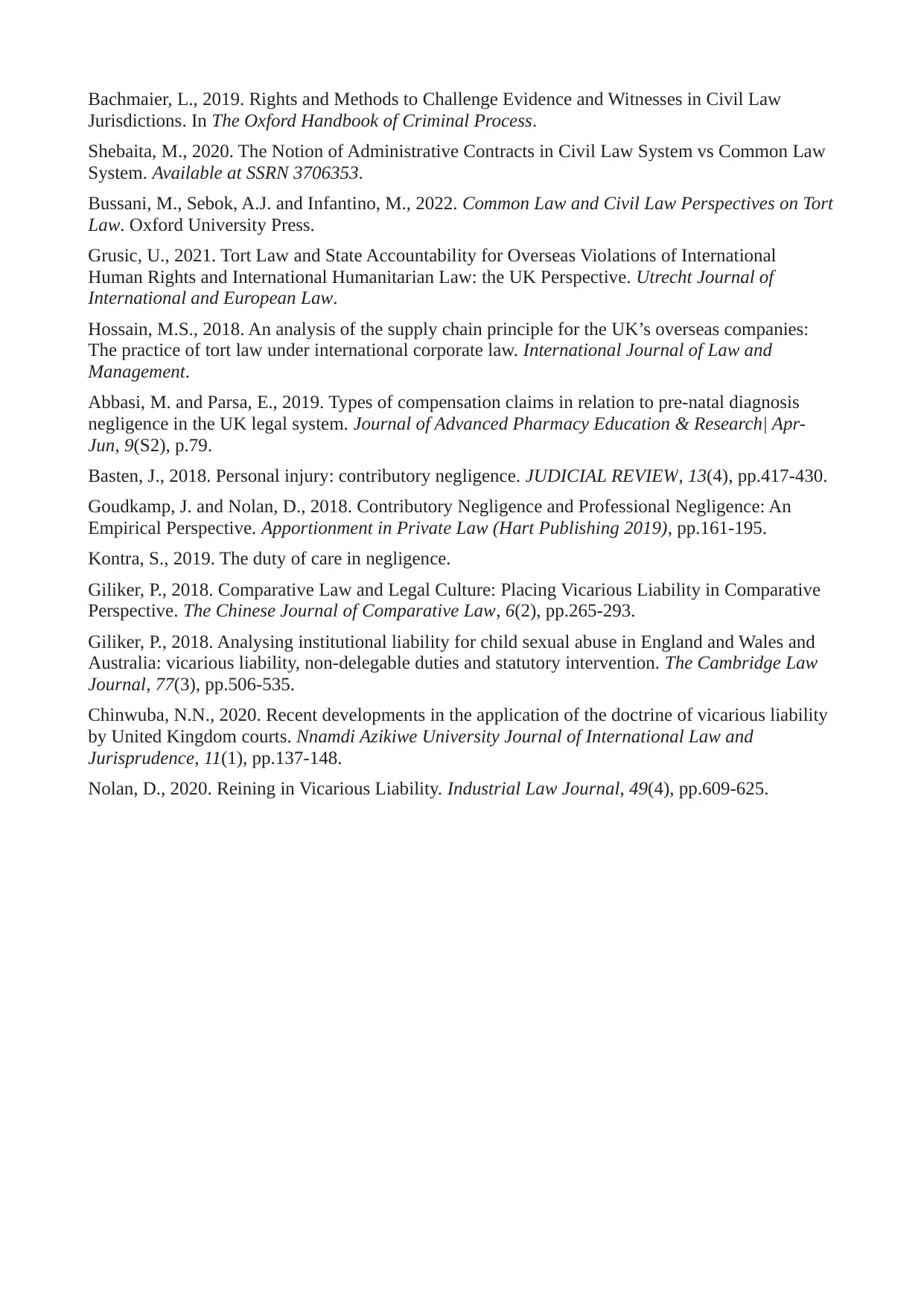
Bachmaier, L., 2019. Rights and Methods to Challenge Evidence and Witnesses in Civil Law
Jurisdictions. In The Oxford Handbook of Criminal Process.
Shebaita, M., 2020. The Notion of Administrative Contracts in Civil Law System vs Common Law
System. Available at SSRN 3706353.
Bussani, M., Sebok, A.J. and Infantino, M., 2022. Common Law and Civil Law Perspectives on Tort
Law. Oxford University Press.
Grusic, U., 2021. Tort Law and State Accountability for Overseas Violations of International
Human Rights and International Humanitarian Law: the UK Perspective. Utrecht Journal of
International and European Law.
Hossain, M.S., 2018. An analysis of the supply chain principle for the UK’s overseas companies:
The practice of tort law under international corporate law. International Journal of Law and
Management.
Abbasi, M. and Parsa, E., 2019. Types of compensation claims in relation to pre-natal diagnosis
negligence in the UK legal system. Journal of Advanced Pharmacy Education & Research| Apr-
Jun, 9(S2), p.79.
Basten, J., 2018. Personal injury: contributory negligence. JUDICIAL REVIEW, 13(4), pp.417-430.
Goudkamp, J. and Nolan, D., 2018. Contributory Negligence and Professional Negligence: An
Empirical Perspective. Apportionment in Private Law (Hart Publishing 2019), pp.161-195.
Kontra, S., 2019. The duty of care in negligence.
Giliker, P., 2018. Comparative Law and Legal Culture: Placing Vicarious Liability in Comparative
Perspective. The Chinese Journal of Comparative Law, 6(2), pp.265-293.
Giliker, P., 2018. Analysing institutional liability for child sexual abuse in England and Wales and
Australia: vicarious liability, non-delegable duties and statutory intervention. The Cambridge Law
Journal, 77(3), pp.506-535.
Chinwuba, N.N., 2020. Recent developments in the application of the doctrine of vicarious liability
by United Kingdom courts. Nnamdi Azikiwe University Journal of International Law and
Jurisprudence, 11(1), pp.137-148.
Nolan, D., 2020. Reining in Vicarious Liability. Industrial Law Journal, 49(4), pp.609-625.
Jurisdictions. In The Oxford Handbook of Criminal Process.
Shebaita, M., 2020. The Notion of Administrative Contracts in Civil Law System vs Common Law
System. Available at SSRN 3706353.
Bussani, M., Sebok, A.J. and Infantino, M., 2022. Common Law and Civil Law Perspectives on Tort
Law. Oxford University Press.
Grusic, U., 2021. Tort Law and State Accountability for Overseas Violations of International
Human Rights and International Humanitarian Law: the UK Perspective. Utrecht Journal of
International and European Law.
Hossain, M.S., 2018. An analysis of the supply chain principle for the UK’s overseas companies:
The practice of tort law under international corporate law. International Journal of Law and
Management.
Abbasi, M. and Parsa, E., 2019. Types of compensation claims in relation to pre-natal diagnosis
negligence in the UK legal system. Journal of Advanced Pharmacy Education & Research| Apr-
Jun, 9(S2), p.79.
Basten, J., 2018. Personal injury: contributory negligence. JUDICIAL REVIEW, 13(4), pp.417-430.
Goudkamp, J. and Nolan, D., 2018. Contributory Negligence and Professional Negligence: An
Empirical Perspective. Apportionment in Private Law (Hart Publishing 2019), pp.161-195.
Kontra, S., 2019. The duty of care in negligence.
Giliker, P., 2018. Comparative Law and Legal Culture: Placing Vicarious Liability in Comparative
Perspective. The Chinese Journal of Comparative Law, 6(2), pp.265-293.
Giliker, P., 2018. Analysing institutional liability for child sexual abuse in England and Wales and
Australia: vicarious liability, non-delegable duties and statutory intervention. The Cambridge Law
Journal, 77(3), pp.506-535.
Chinwuba, N.N., 2020. Recent developments in the application of the doctrine of vicarious liability
by United Kingdom courts. Nnamdi Azikiwe University Journal of International Law and
Jurisprudence, 11(1), pp.137-148.
Nolan, D., 2020. Reining in Vicarious Liability. Industrial Law Journal, 49(4), pp.609-625.
1 out of 8
Related Documents
Your All-in-One AI-Powered Toolkit for Academic Success.
+13062052269
info@desklib.com
Available 24*7 on WhatsApp / Email
![[object Object]](/_next/static/media/star-bottom.7253800d.svg)
Unlock your academic potential
Copyright © 2020–2026 A2Z Services. All Rights Reserved. Developed and managed by ZUCOL.


